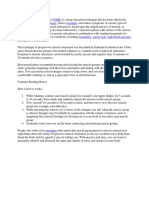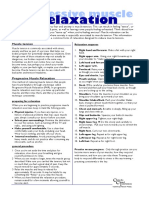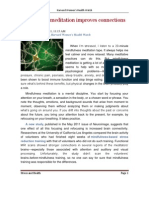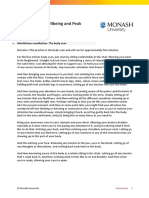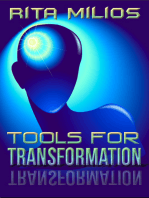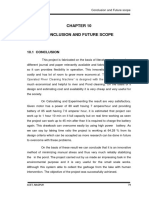Module 5: Mind Body Balance
Uploaded by
Jared Khoo Er HauModule 5: Mind Body Balance
Uploaded by
Jared Khoo Er HauModule 5: Mind body balance
Synopsis:
This module combines the theories, philosophies and correct postures to develop a balance between
mind and body. Participants will be taught that meditation calms the mind and body, and then will
leave the person feeling relaxed and refreshed. Developing mindfulness of the connections between
mind and body is a form of intelligence just as important as IQ, EQ (emotional intelligence), or social
intelligence. As awareness deepens, bodily sensations provide feedback and guidance about every
aspect of life, from nurturing relationships to enhancing effectiveness at work. By learning some
techniques participants can reduce stress, balance their life, and maximize their innate potential for
health, creativity, and spiritual growth. Mind–body therapies explore the relationships between the
mind, body, spirit, and behaviour upon the belief that the mind can regulate bodily functions and
symptoms.
TOPICS:
1 Mind – body communications maintain wellness
How thoughts contribute to good health
Mind-body methods for promoting health (Autogenic training, biofeedback, hypnosis
and healing)
2 Mechanisms of mind body communication
Emotions and its physiological response
The brain and its role in mental activity
3 The autonomic nervous system, hormones, the immune system
Function of each system in human body
Respond of each system to changes in emotions/thoughts
The methods of influencing the systems through mind
4 Placebo effect and the Nocebo effect
Understanding Placebo effect and the Nacebo effect
How these ‘effects’ influence the outcome of the disease
Role of ‘placebo pills’ in treating illness
Using words to produce placebo effect (Positive, constructive practitioner VS negative,
pessimistic practitioner)
5 The relaxation response, Autogenic training, biofeedback, hypnosis and healing
Understanding the function and mechanism of each method provided
The steps involved in each method provided
6 Meditation
Types of meditation and description for each
o Zen meditation
o Transcendental meditation
o Insight meditation
o Religious image
o Prayer to god
Simple suggestion to begin meditating (the setting, posture/position, timing, attention
on breathing)
Benefits of meditating
7 Taking time out to quieten the mind
Stress
Definition of stress
Difference between ‘eustress’ and ‘distress’
Warning signs of stress
Component of stress
The environmental component (stressors can be classified into :)
o Harm and loss situation
o Threat situation
o Challenge situation
The mental component
The emotional component
How stress occurs and contributes to illness
Causes mind and body to become exhausted, worn down and damaged
Weakening immunity
Motivating unhealthy behavior in attempt to deal with stress
Managing stress – restoring mind- body harmony
Factors affecting the experience of stress
Predictability
Personal control
Belief in outcome
Social support
The general adaptation syndrome
3 stage biological response to stress
o stage of alarm
o stage of resistance
o stage of exhaustion
Stress and the immune system
Effect of stress on immune system
Post-traumatic stress disorder
Time management
Questionnaire for stress
Example of lifestyle optimization and time management plans
Review of case studies
Interactive quiz
Upon successful completion of this course, participants should be able to perform the followings:-
Identify mechanisms of mind body communication
Identify Mind/body techniques that have been effective in stress management
Describe the physiological components of stress
Describe how stress occurs and contributes to illness
Define the mental and emotional component of stress
Understand the epidemiology, etiology, diagnosis, comorbidity, course and prognosis of
PTSD
You might also like
- Yoga Nidra Practice Script - Inner ResourceNo ratings yetYoga Nidra Practice Script - Inner Resource8 pages
- Resourcing, Pendulation and Titration - Practices From Somatic Experiencing®No ratings yetResourcing, Pendulation and Titration - Practices From Somatic Experiencing®1 page
- What Is The Spiral?: Break The Patterns. Set Yourself FreeNo ratings yetWhat Is The Spiral?: Break The Patterns. Set Yourself Free2 pages
- BEYOND - Center For New Energy LebensARTNo ratings yetBEYOND - Center For New Energy LebensART4 pages
- Eft: Tapping Into New Solutions: Masha BennettNo ratings yetEft: Tapping Into New Solutions: Masha Bennett2 pages
- Psychotherapy Biodynamic Body Psychotherapy & Counselling: The 'Primary Personality'No ratings yetPsychotherapy Biodynamic Body Psychotherapy & Counselling: The 'Primary Personality'10 pages
- Panic Information Sheet - 05 - Progressive Muscle Relaxation PDFNo ratings yetPanic Information Sheet - 05 - Progressive Muscle Relaxation PDF1 page
- Inhabiting The Body As Unitive Consciousness Judith BlackstoneNo ratings yetInhabiting The Body As Unitive Consciousness Judith Blackstone10 pages
- EFT Level 1 Training I September - October 2020No ratings yetEFT Level 1 Training I September - October 20207 pages
- Assigned Reading - Travis (2020) Neurobiology of MeditationNo ratings yetAssigned Reading - Travis (2020) Neurobiology of Meditation16 pages
- Theeboom Et Al - Does Coaching Work - Ameta-AnalysisNo ratings yetTheeboom Et Al - Does Coaching Work - Ameta-Analysis19 pages
- Mindfulness Meditation Improves Connections in The Brain: Carolyn Schatz, Editor, Harvard Women's Health WatchNo ratings yetMindfulness Meditation Improves Connections in The Brain: Carolyn Schatz, Editor, Harvard Women's Health Watch6 pages
- Holographic Healing - 5 Keys To Nervous System Consciousness (PDFDrive)No ratings yetHolographic Healing - 5 Keys To Nervous System Consciousness (PDFDrive)100 pages
- New Mental Protocol: Mental Questions, Problems, Disorders, Illnesses, and Dysfunctions Are All Linked TogetherNo ratings yetNew Mental Protocol: Mental Questions, Problems, Disorders, Illnesses, and Dysfunctions Are All Linked Together2 pages
- A Meditation To Tap Into A Sense of Unchanging Well Being100% (2)A Meditation To Tap Into A Sense of Unchanging Well Being3 pages
- EFT Ends A Strong Addiction To Smoking CigarettesNo ratings yetEFT Ends A Strong Addiction To Smoking Cigarettes3 pages
- Releasing Stuck Energy Process: The BenefitsNo ratings yetReleasing Stuck Energy Process: The Benefits1 page
- Yogi Bhajan Lecture: Healing in The Aquarian AgeNo ratings yetYogi Bhajan Lecture: Healing in The Aquarian Age2 pages
- Anger Management Kundalini Yoga ExerciseNo ratings yetAnger Management Kundalini Yoga Exercise5 pages
- Nature of Human Being and Spirituality: by Mohd Rushdan Bin Mohd Jailani (PHD)No ratings yetNature of Human Being and Spirituality: by Mohd Rushdan Bin Mohd Jailani (PHD)25 pages
- EFT Tapping Script For Comparison and Jealousy - Tap Easy100% (1)EFT Tapping Script For Comparison and Jealousy - Tap Easy8 pages
- Comparasion of Johson Rasselas and Russel's Conquest of HappinessNo ratings yetComparasion of Johson Rasselas and Russel's Conquest of Happiness3 pages
- Alternative Fibromyalgia Pain Management Suggestions100% (1)Alternative Fibromyalgia Pain Management Suggestions4 pages
- How to Restore Your Health: Practical Steps to Transform Your Mind, Nutrition and LifestyleFrom EverandHow to Restore Your Health: Practical Steps to Transform Your Mind, Nutrition and LifestyleNo ratings yet
- Spirituality in The Workplace: by Ginger Lapid-Bogda, PH.DNo ratings yetSpirituality in The Workplace: by Ginger Lapid-Bogda, PH.D5 pages
- Meditation For Beginners; MEDITATION THE KEY TO HAPPINESS - 100 Meditations for Healing, Success, and PeaceFrom EverandMeditation For Beginners; MEDITATION THE KEY TO HAPPINESS - 100 Meditations for Healing, Success, and PeaceNo ratings yet
- Compulsory Service Exemption Request FormNo ratings yetCompulsory Service Exemption Request Form8 pages
- Faculty of Medicine and Health Sciences Score Sheet For CASE Write-UpNo ratings yetFaculty of Medicine and Health Sciences Score Sheet For CASE Write-Up30 pages
- Commented (DN1) : OA Knee Is Usually Bilateral. SLE or RA IsNo ratings yetCommented (DN1) : OA Knee Is Usually Bilateral. SLE or RA Is1 page
- EAS1000-1.823 Hot Air Sealer Operations Manual PublishedNo ratings yetEAS1000-1.823 Hot Air Sealer Operations Manual Published26 pages
- First Steps in Mathematics - Measurement-Resource-Book-2No ratings yetFirst Steps in Mathematics - Measurement-Resource-Book-2154 pages
- Grade VIII Lesson 2. Geography Lesson: PoetryNo ratings yetGrade VIII Lesson 2. Geography Lesson: Poetry8 pages
- Huafengdongli 495 4100 Series Operationmanual100% (39)Huafengdongli 495 4100 Series Operationmanual7 pages
- From The Rear of The Hand To The Front of The Thigh) and 6 Inches To The Rear (Measured From The Front of The Hand To The Back of The Thigh)No ratings yetFrom The Rear of The Hand To The Front of The Thigh) and 6 Inches To The Rear (Measured From The Front of The Hand To The Back of The Thigh)4 pages
- Defining Abaqus Contacts For 3-D Models in Hypermesh - Hm-4320No ratings yetDefining Abaqus Contacts For 3-D Models in Hypermesh - Hm-432012 pages
- Titi Hayati-13020117130056-Midterm Pop WritingNo ratings yetTiti Hayati-13020117130056-Midterm Pop Writing1 page
- Instant Download (eBook PDF) Introductory Chemistry: An Active Learning Approach 6th Edition PDF All Chapters100% (7)Instant Download (eBook PDF) Introductory Chemistry: An Active Learning Approach 6th Edition PDF All Chapters56 pages
- Nitrified Pressurized Mud Cap Drilling Enables Continued Drilling With Zero NPT Through HighlyNo ratings yetNitrified Pressurized Mud Cap Drilling Enables Continued Drilling With Zero NPT Through Highly1 page
- Activator Elastic Open in Klammt Treatment of Bad Occlusion Class Ii Division 1No ratings yetActivator Elastic Open in Klammt Treatment of Bad Occlusion Class Ii Division 15 pages




